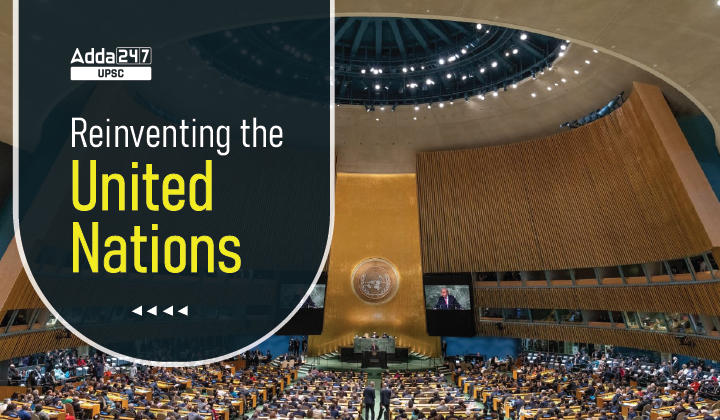Table of Contents
Reinventing the United Nations: Relevance for UPSC Exam
General Studies III- Inclusive Growth & Issues
Reinventing the United Nations: Context
- The United Nations Secretary General (UNSG), António Guterres, addressed the United Nations General Assembly and said “The world is in big trouble, gridlocked in colossal global dysfunction, even the G20 is in the trap of geopolitical divides”.
United Nations: History
- The League of Nations set up in 1920, was the first intergovernmental organization with the aim to promote international cooperation and outlived its utility with World War II.
- The United Nations claims to be the one place where all the world’s nations can discuss common problems and find shared solutions that benefits all of humanity.
Why United Nation is at inflection point?
- A Club outside UN: The G7 Summit, held in June, endorsed the goals of a cooperative international Climate Club to accelerate climate action outside the UN.
- Nonworking of WTO: The dispute settlement mechanism of the WTO without the quorum of its members has rendered the institution dysfunctional.
- Failed promises: Despite the G7 having accepted the need for transfer of funds at Rio in 1992, because of their role in creating the climate crisis, the promise made in 2009 to provide at least $100 billion per year in climate finance remains unfulfilled.
- The China challenge: China has opted for rival set of multilateral institutions. China’s Belt and Road Initiative (BRI) seeks to achieve policy, infrastructure, trade, financial, and people to people connectivity by building a new platform for international cooperation to create new drivers of shared development, and covers half the world population with one third the GDP and investment of $930 billion.
- Challenge of non-traditional security: China’s Global Development Initiative 2021, and linked Global Security Initiative, 2022, is developing a conceptual frame responding to an urbanising world, i.e., digital governance and non- traditional security, which the international system has not covered.
- A divide within the UN: More significant than the clash of institutions reflecting the deepening divide between the Atlantic powers and the Russia-China combine is the diffusion of wealth, technology and power. The ‘rest’, despite threats, are now capable of not taking sides and are looking for leadership within the United Nations, for what the UNSG characterised as “coalition of the world”.
Reinventing the United Nations: Road ahead
- Strategists in major powers see the world in binary terms around rules. In a multipolar world, the question is the kind of rules needed for human wellbeing and whether principles would serve the purpose better.
- The time is ripe for a big idea that both keeps away from the current multilateral focus on global rules, amount of aid and inviolability of IPR’s as well as recognises a role for competing institutions as countries can now secure the best terms themselves without bargaining.
- Just as the ‘Rio principles’ continue to guide climate change, Vasudhaiva Kutumbakam, or ‘world as one family’, focusing on comparable levels of wellbeing can be the core of a set of universal socio-economic principles for a dialogue between the states.
- To the current global consensus around equitable sustainable development, Prime Minister Narendra Modi has added a clearer societal purpose to flesh out a universal Civilizational principle. He emphasized “Lifestyle for Environment” seeing climate change as a societal process.
Reinventing the United Nations: India’s Role
- India’s Presidency of the Group of 20, UN Security Council (UNSC)in 2022, and the Shanghai Cooperation Organization (SCO) in 2023 when major powers are not even talking to each other and India alone, now the fifth largest economy, is interacting with each of them, presents a historic opportunity.
Conclusion
United Nations, however dysfunctional, the only global platform for world governance. No country would gain by falling UN. Even if we dissolve UN, there is no alternative than reinventing the UN again. India’s and global interest lie in preserving the UN rather than dismantling of UN.




 TSPSC Group 1 Question Paper 2024, Downl...
TSPSC Group 1 Question Paper 2024, Downl...
 TSPSC Group 1 Answer key 2024 Out, Downl...
TSPSC Group 1 Answer key 2024 Out, Downl...
 UPSC Prelims 2024 Question Paper, Downlo...
UPSC Prelims 2024 Question Paper, Downlo...
